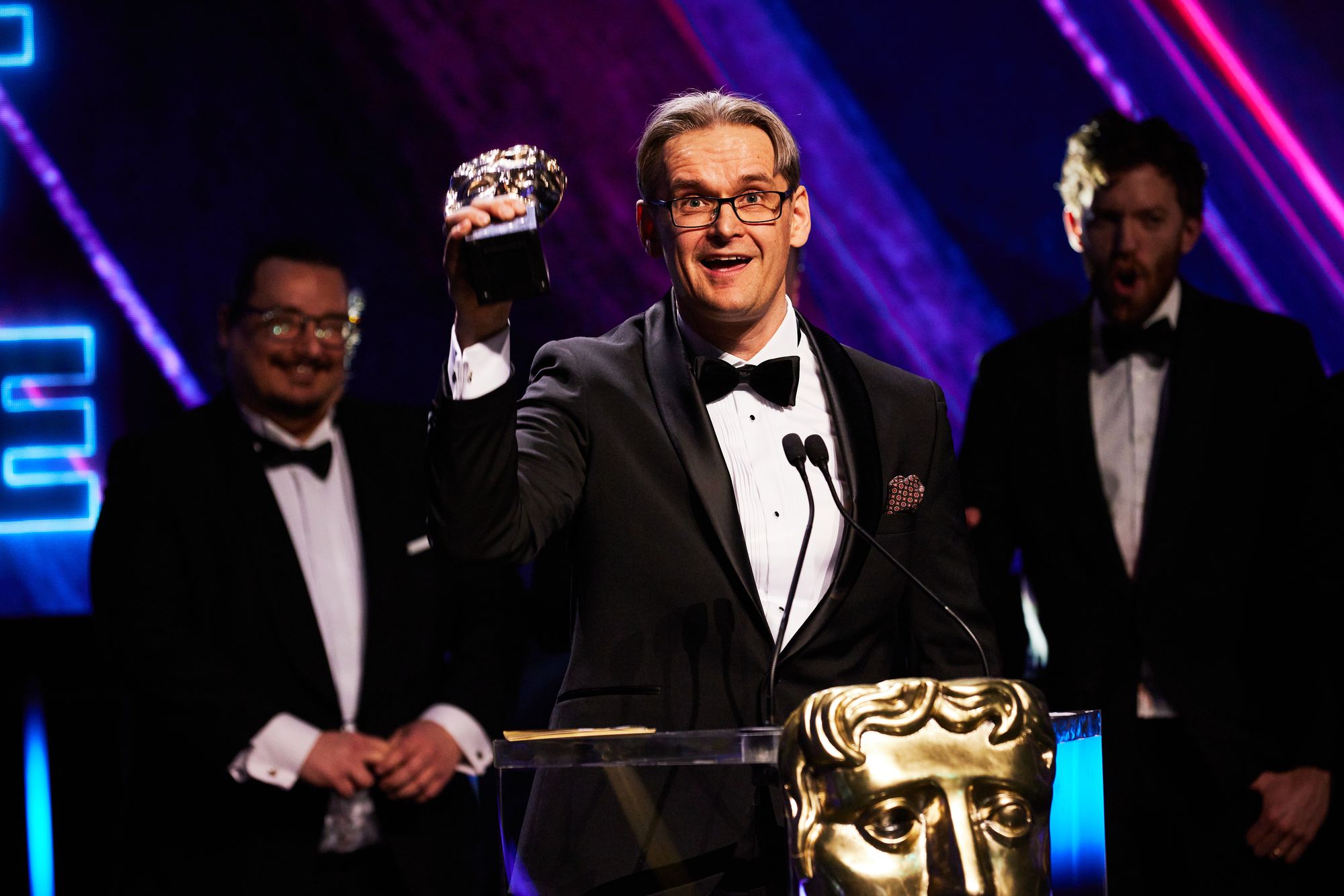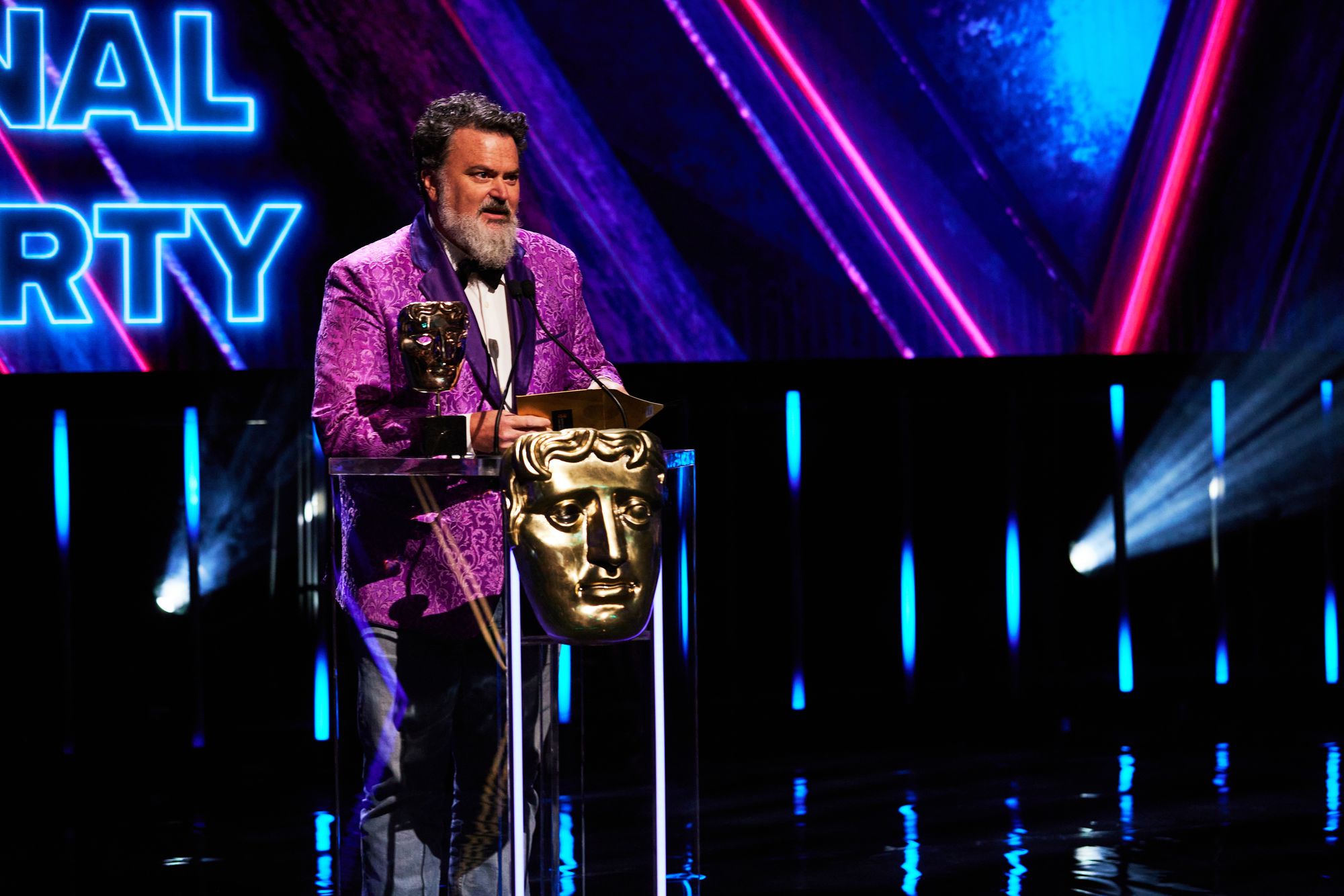
GameCentral speaks to Sir Ian Livingstone about his next Fighting Fantasy book and learns not to expect Psychonauts 3 anytime soon.
After two years as an online-only event the Bafta Games Awards was back to being a real-world event this year, at the Hall on ’s South Bank. There was a clear air of relief to be out and about in person, rather than perched behind laptops, as attendees ratcheted up the glitz and glamour, while a number of much-loved games were rewarded with the famous mask-shaped trophies.
Chief among those was Returnal, Housemarque’s innovative sci-fi roguelike for the PlayStation 5, which won four . One of which was for actor Jane Perry, in the performer in a leading role category, two others were for audio achievement and music and to cap off Returnal’s evening, it won the most coveted gong of all: best game.
Other notable winners included It Takes Two, the genre-bending, two-player co-op effort developed by Hazelight and published by EA, which triumphed in the multiplayer and original property categories. Unpacking, the innovative game about moving into a new house, from tiny Australian developer Witch Beam, also won two Baftas: one in the narrative category and the other in the only public-voted category: EE game of the year. Ratchet & Clank: Rift Apart also won two Baftas, for animation and technical achievement.
A raft of much-loved games had to settle for a solitary Bafta, including Psychonauts 2 (for Kimberley Brooks: Best Actor in a Supporting Role), Forza Horizon 5 (Best British Game), No Man’s Sky (Evolving Game), Inscryption (Games Design), and The Artful Escape (Artistic Achievement). Toem, from tiny Swedish developer Something We Made, scooped the Debut Game award.
We caught up with a jubilant Housemarque after they had won their first two Baftas, for audio achievement and music – not the best game trophy.
‘It was a long process of iterating and working with the team: making sure the music really sat in the world and brought that world to life. We had to work out what the actual sound was going to be and embedding that sound into the world was a big part of it: making sure it sat in the world in a way that brought that world to life,’ said principal music producer Joe Thwaites. ‘The music and the audio are so embedded together as one thing, and I think that’s why they are getting appreciated.’
After winning the original property Bafta, It Takes Two game director Josef Fares said: ‘We really didn’t expect this one.’ And he paid tribute to the game’s publisher, EA: ‘You need a publisher who trusts the developer and lets them go with it. Because in our trailers, a lot of people didn’t really get what the game was. That’s why it’s extra fun to have this.’
Earlier, on the pre-show red carpet, Fares, when asked why It Takes Two had struck such a chord, answered: ‘I have no clue. I come up with ideas that I want to play. And we have a team that is super-passionate and really does everything with its heart and has full creative freedom. To be honest, there are not many co-op games like that: you’ve got your typical drop-in, drop-out games but not a lot of games are specifically designed from the get-go for two-player co-op.’
Witch Beam’s Wren Brier and Tim Dawson seemed touchingly overwhelmed after winning two Baftas with Unpacking, particular given that one of those was public-voted. Dawson said: ‘It’s kind of unreal: because we’re from Australia; sometimes we feel a bit isolated from the rest of what’s going on in the game development space, so to be able to feel like we can compete anyway is great. It makes us feel like we can make things that matter.’
Brier explained Unpacking’s origins and appeal: ‘The game was inspired by a real-life move, when Tim moved in with me, and it was an important part of our relationship. And moving very often coincides with important events in our lives. I’ve moved a lot in my life – every time, it felt like a new chapter, and I guess everyone can relate to that.’
Before the ceremony began, the legendary Bafta red carpet was in full swing, graced by many of the games industry’s great and good. Such as newly-minted knight Sir Ian Livingstone, of Games Workshop, Eidos, and Deathtrap Dungeon fame, who was there to present an award. He was chuffed to be out and about in person again: ‘You can’t beat being together: that magic that happens via people interacting. The creativity levels zoom up when you’re face to face.’
Livingstone hasn’t yet been to the Palace to pick up his knighthood: ‘I haven’t had the ceremony because of the backlog due to Covid. It’s a great honour: obviously, I’m delighted that it’s me. But I think it’s high time that the industry was recognised like other entertainment industries are. There should be more knighthoods, more damehoods.
‘Because the videogame industry really ticks all the right boxes for the economy: it’s high-tech, high-skilled, digital, Intellectual property-creating, export-focused, and regional. There’s an awful lot to like about this industry and we’re very, very good at it in this country, and we should celebrate that more.’
And Livingstone offered up a genuine scoop. It’s the 40th anniversary of the publication of The Warlock of Firetop Mountain, the first Fighting Fantasy book he wrote with Steve Jackson, and: ‘I’m writing a new one: I’ve nearly finished it.’ Reluctantly, given that it hasn’t yet been announced, he told us its title: Shadow of the Giants.

Double Fine’s Tim Schafer, another industry legend, was resplendent in a lurid purple jacket and jeans, and was on expansive form with Psychonauts 2 nominated for seven Baftas (it would go on to win one): ‘I have one Bafta for the screenplay of the first Psychonauts. And then I have one for just being a nice old gentleman – a Fellowship.’
He said we shouldn’t hold our breath for Psychonauts 3: ‘We’ve been doing a point ‘n’ click adventure with Broken Age, and then we did remasters, and then we did the sequel, so we’ve been doing a little bit of looking backwards for the last five years or so, and now I’m really excited about making up new stuff.’
He also spoke about the Psychonauts games’ portrayal of mental health issues: ‘It’s a really easy way to make someone villainous – to write them off as over this other line called insanity. They’re insane, therefore we can fight them and shoot them. We really wanted to get away from that and show that a lot of behaviours come from inner struggles, and if you could actually understand them, you might think of ways to work with and help that person.’
Finally, one of the happiest denizens of the Bafta Games Awards’ red carpet was Maggie Robertson, who shot to fame as the actor behind Resident Evil Village’s unforgettable Lady Dimitrescu. The reaction to Lady Dimitrescu, she said, took her by surprise: ‘It was the very first video game I ever did as well, so I had no expectations on the outcome – I was just literally trying to just do my job to the best of my ability, get through each day and not make a complete fool of myself. So now, having seen that response and being here at the Bafta Games Awards feels very surreal.’
But, she reveals, we can expect more fruits from her virtual acting: ‘It’s funny because when I moved to Los Angeles, I moved there with the intention of pursuing on-camera work. And since booking Resident Evil, I’ve just completely fallen in love with video games, and voiceover, and I’ve totally pivoted my life to be in this direction instead. Hopefully in a couple of years, once my non-disclosure agreements are released and the games are out, I will be able to tell you all about it, and you shall be able to see me in the games.’
By Steve Boxer
Email [email protected], leave a comment below, and .
Follow Metro Gaming on and email us at [email protected]
For more stories like this, .




















